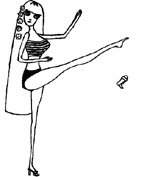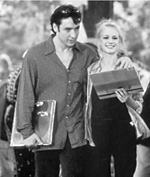FAITH CONLON NOTICED her office was oddly silent one morning early last year. The publisher of Seattle’s Seal Press, a small but nationally known feminist publishing house, wandered out to see why her typically effusive staff was so quiet. She found them all intently working in a side office. No one spoke or even looked up; all their heads bent over a table-turned-workbench. But instead of rallying around a new piece of fiction, the 10 or so employees were happily defacing Barbie dolls. The playground icon’s blonde silken locks were hacked off into Joan of Arc-style coifs, and Barbie’s bubble-gum pink uniform had been converted to a jagged tank top. Her miniature high heels were nowhere to be seen. “I’ve never seen them be so intense,” Conlon says. “It was dead silent in there.”
For tiny Seal Press, this exercise in playtime aggression was also the calm before an unexpected storm. In late 1998 the publishing company released Adios, Barbie, a collection of essays rethinking the feminine form as something post-ectomorphic and Caucasian. In December of 1999, an ominous article from The New York Times‘ business section hit Conlon’s desk. The first line of the December 6 piece read, “Mattel, the maker of the Barbie doll, is suing the publishers of Adios, Barbie.” This was the first Conlon had heard about legal action from the legendary toy maker. She was stunned. Days later, she was served with papers from Mattel’s lawyers in LA. The suit claimed Seal Press caused, among other terrible disservices to the blonde doll, “consumer confusion”—in short, that parents and children shopping for Barbie in a liberal bookstore might mistakenly think a book with Babs’ name on it would actually contain important information about their favorite plastic pal.
“We thought it was pretty outrageous,” remarks Conlon. “The book had been out an entire year, and we just thought that the First Amendment provided us with every right to evoke the outrageousness of tall, thin, and white being the only widely accepted body type.” Adios, Barbie has been widely used for academic purposes; women’s studies classes have snapped up the book as course subject fodder, making it one of Seal’s top sellers. Ironically, when Mattel slapped the Seattle house with a lawsuit, the resulting media attention boosted sales of Adios, Barbie even higher. To date, it has sold 12,000 copies—a number that not only pleases Conlon but brings in funding that she hopes will allow her company to continue printing other feminist books.
A sampling of Adios, Barbie‘s essays leaves little possibility that readers would assume the material to be endorsed by Barbie’s protectors. Though the doll is rarely mentioned outright, the book showcases the diverse voices of vibrant writers—some Latina, some Jewish, some plus-sized, some athletic—all of whom are avid Barbie-haters. In the single essay that calls Babs on her blank-eyed but dangerous shtick, “Klaus Barbie, and Other Dolls I’d Like to See,” Susan Jane Gilman writes, “Barbie is the only toy in the Western world that human beings actively try to mimic. Barbie is not just a children’s doll; it’s an adult cult and aesthetic obsession.” Examples include Pamela Anderson Lee; the psycho woman who has spent her life savings paying for plastic surgery that will make her look just like a human Barbie (as seen on 60 Minutes and various talk shows); and endless fashion magazine spreads featuring Barbie look-alikes.
The book does not set out to destroy Mattel’s business, but to make mothers, aunts, sisters, and daughters think twice—to think about what Barbie subliminally tells those children who don’t reflect tall, thin, and white in the mirror—before they bop over to eToys and buy the latest gown-encased model. Adios, Barbie editor Ophira Edut phrases it best in the book’s introduction: “You’re busted, Babs. You’ve been found guilty of inspiring fourth grade girls to diet, of modeling an impossible beauty standard, of clinging to homogeneity in a diverse new world . . . pack your bags and be outta the Dreamhouse by noon.”
Still, did Seal Press really think Mattel wouldn’t take it personally? The book’s cover features Barbie’s unmistakable pink heart locket, her foot (molded for an eternity in high heels), and blinding fuschia accessories. It turns out these dainty pieces provided the framework for Mattel’s lawsuit against the publisher. Barbie’s shoe, brush, locket, dress, and, yes, her curved instep, are all heavily trademarked and off-limits. Ditto the shade of pink Seal chose for its cover hue. “They said we used Barbie’s ‘trademark pink,'” snickers Conlon. “I didn’t know you could trademark a color, but they did. We may have overstepped our boundaries, but it was all tongue-in-cheek absurdity.”
Just when the legal load began to crush the life out of Seal’s fight, the American Civil Liberties Union (ACLU) stepped in to offer assistance. In January, the suit was settled out of court. The agreement Seal arranged with Mattel dictates that once its current run is sold out (3,000 copies are left from the first printing), they will not only have to change the title, but also redesign the entire cover. “Ultimately we decided it was more important to keep putting the book on shelves than it was to fight it and possibly drain resources from our other titles,” Conlon explains. “We are a small publisher; we’re not insured for the costs associated with this type of lawsuit.”
It’s not the first time Mattel has groused when the little people poked fun at the Princess of Pink. Back in 1997, then-unknown Danish pop group Aqua released a song called “Barbie Girl.” It went on to become the quartet’s worldwide hit single. It was then that Mattel hit them with a lawsuit, which (with the support of MCA Records’ legal team) resulted in a summary judgment. The singer of San Francisco roots rock band The Naked Barbies, Patty Spiglanin, was working in a law firm around the time Aqua’s “Barbie Girl” fiasco was receiving attention. A lawyer in her office passed her an article about the pending suit; she was surprised to read her band’s name listed in Aqua’s brief as a defense. Fearful that she might have to change the name her group had been known by since 1990, Spiglanin called Mattel’s legal department and left a message.
“I was trying to appeal to any human element there,” she remembers. “A really nice lawyer from Mattel called me back and said, ‘Sorry, but there’s no way you can keep your name. You’re diluting our trademark.'” Spiglanin was crushed but thankful it wasn’t too late for her to avert legal repercussion. Her band is now named the Vagabond Lovers and plans on releasing a Barbie-free record in May. Her experience in law has taught her to be careful: “If marketing is involved, Mattel will pursue you. I know it’s nothing personal, but they’re very aggressive. How many people can afford to fight a company as big as Mattel?”
Or a doll as little as Barbie. Conlon muses over the look and title of Adios, Barbie‘s next incarnation. “We’ve tossed around the idea of naming it Arrived鲣i, Babs,” she laughs. “And making the cover entirely bright pink.”
Read more about Barbie in this week’s Weekly.







